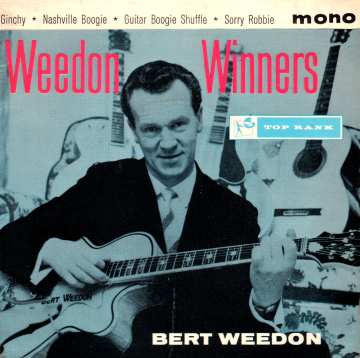|
Bert Weedon studied music as a child and by the time he'd entered his teens had decided to try his hand with the guitar. Although he didn't initally have very lofty ambitions with the instrument, after hearing it played classically he became fascinated by the complexity of the music it could produce. He decided that he wanted to be able to play in the same way and was very fortunate to find a local tutor who was capable and willing to teach him the instrument to this high standard. Despite his classical training, the greatest demand was for jazz and popular dance music and it was this that brought him his first engagements and raised him to the status of a professional musician. His skill with the guitar placed him at great demand, and by the end of the 1940s he had begun a progression that would lead him to play with the great orchestras of the time including those of Cyril Stapleton , Ted Heath and the Squadronaires. He is also known to have accompanied the great Django Reheinhardt, and Stephane Grappeli when these legendary members of the 'Hot Club Of France' toured the UK.. When 'Rock And Roll' hit the UK during the late 1950s, Bert was already producing recorded material- frequently as a session musician. Despite the fact that he sometimes found himself backing singers who had little musical ability Bert decided to embrace the new music rather than spurn it, as many musicians of his generation did. As the 1950s drew to a close Bert was undoubtedly recognised as the UK's premier popular guitar soloist. In addition to playing and recording, Bert also began composing 'rock and roll' instrumental numbers, the best known of which is probably 'Ginchy'- a number that has been covered and remade by guitarists on both sides of the Atlantic. |
|
 |
The EP shown here (Top Rank JKP 3008) contains quite a decent set of biographical notes written by James Wynn of New Musical Express. He tells us that Bert appeared uncredited on recordings made by Tommy Steele, Marty Wilde, Laurie London and Terry Dene. He doesn't tell us which ones though! |
|
Although Bert Weedon became the only British guitarist to rival the great Duane Eddy, his main influence would be through a book. Realising that the enthusiasm for the guitar shown by many youngsters in skiffle and rock and roll groups was not matched by their ability to play the instrument, Bert set about writing a book that would introduce them to the basics. It was called 'Play In A Day' and this simple work was probably responsible for helping to get some of the best known future names in music started. The book became so well known at a time when so many youngsters were turning their attentions to the guitar that it became popular all over the world. As record buyers' tastes for guitar instrumentals waned during the 1960s, Bert Weedon's production of singles slowly came to an end. However, he has remained a popular, even revered, musical figure and a popular stage and cabaret virtuoso. |
|
